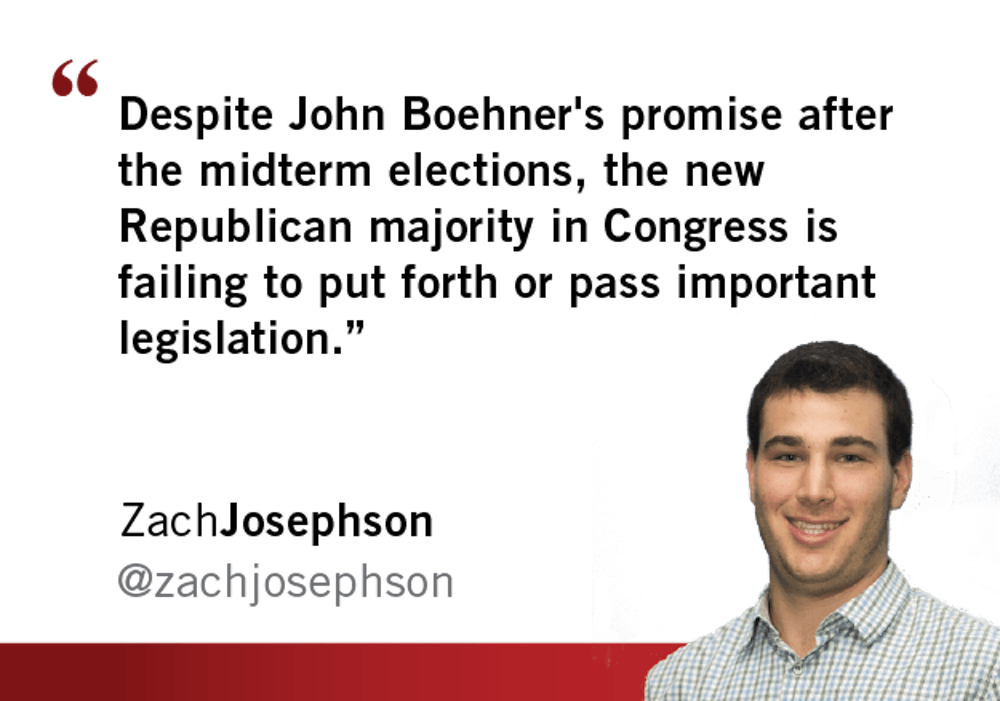Late last year, Republican Speaker of the House John Boehner was riding high off of the Republicans' historic wins in the 2014 term elections. Following the Election Day victories, Boehner and Senate Majority Leader Mitch McConnell penned an op-ed in the Miami Herald in which they promised, “Republicans will return the focus to the issues at the top of your priority list. Your concerns will be our concerns. That’s our pledge.”
Unfortunately, only a little more than a month into their new majority, Republicans seem incapable of getting any important legislation passed, despite having taken pointless votes to repeal the Obama administration's health care law and trying to approve the Keystone XL pipeline.

While they have had conflicts with Democrats in the Senate who have filibustered legislation, the current Department of Homeland Security budget debates have shown an inability to reach an agreement within the Republican Party.
Senate Democrats have shown their unwillingness to vote in favor of any DHS funding bill that would defund President Barack Obama’s recent executive action on immigration, but since passing their original proposal, Boehner’s House has been unwilling to put forth a “clean” funding bill that would have a chance of passing through the Senate.
Back in 2013, the budget debate caused a full government shutdown after Republicans and Democrats were unable to come to a funding agreement. Despite only being in control of one house, Republicans were widely blamed for the shutdown. A Politico article written during the shutdown refers to a poll that tried to determine who the public felt was responsible for the shutdown. “The poll, conducted by Greenberg Quinlan Rosner Research, found that voters blame the GOP more than Democrats for the shutdown by a 43 percent to 27 percent margin.”
It’s unclear how the public will perceive the looming DHS shutdown, but it’s hard to imagine that the public will look more favorably upon the Republican Party after they promised such big things. Boehner’s Republican Party appears to be in shambles over the DHS funding bill, but that’s actually the smaller of the two crises he’s created within his own party.
In March, Israeli Prime Minister Benjamin Netanyahu will be coming to Washington, D.C., to address Congress about the dangers of a nuclear Iran and to criticize the Obama administration’s recent negotiations.
While Boehner continues to defend the decision to invite Netanyahu to address Congress, he has taken a lot of criticism, even from within his own party. Last weekend, while on “Fox News Sunday," host Chris Wallace seemed very critical of the way Boehner had handled the situation.
He asked Boehner, “But it has created a — if not a firestorm, certainly a controversy here. It has a created a controversy in Israel. And shouldn’t the relationship between the U.S. and Israel be outside of politics?”
Conventional political wisdom has suggested that partisan politics stopped at the water’s edge and when it came to foreign policy, both parties should come together to present a unified front. Boehner clearly doesn’t subscribe to that method of shaping foreign policy and has now politicized negotiations with Iran and doubled the number of controversies looming over him.
Given what appeared to be a very unified party coming out of the 2014 midterms, the Republican Party now appears to be in shambles and Boehner seems unable to keep the party together. At this pace, the next two years are shaping up to be long and unproductive ones in Congress.
Reach the columnist at zjosephs@asu.edu or follow @zachjosephson on Twitter.
Editor’s note: The opinions presented in this column are the author’s and do not imply any endorsement from The State Press or its editors.
Want to join the conversation? Send an email to opiniondesk.statepress@gmail.com. Keep letters under 300 words and be sure to include your university affiliation. Anonymity will not be granted.
LikeThe State Press on Facebook and follow @statepress on Twitter.




